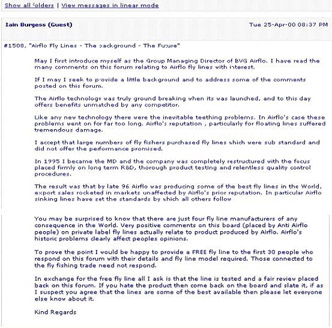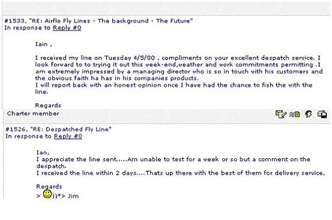Conclusions
Knowledge possessed by consumers can only become a source of organizational knowledge offering business benefits to companies if consumers are given a voice. In order to create value for themselves , companies should explore ways of participating in the consumer-to-consumer conversations that are already taking place around virtually any topic of interest. It is essential that companies that do participate do so without appearing to dominate consumer territory with an obviously commercial motivation. Companies must facilitate interaction, and integrate communication and knowledge exchange with consumers into normal working practices, offering some benefits to the consumers. While consumers are aware that through the Internet they have the potential to share their views of products and services with other consumers, unless their views are responded to by companies, they can have little effect and fail to bring about 'Consumer Empowerment.'
Consider the following example of a company director engaging in conversation with consumers. This example was brought to the attention of the researcher by one of the interview participants . Following negative comments about the company's products on a message board, the Managing Director writes :
Airflo's historic problems clearly affect people's opinions . To prove a point, I would be happy to provide a FREE fly line to the first 30 people who respond on this forum with their details and model required. In return, all I ask is that the line is tested and a fair review placed back on this forum. If you hate the product, then come back on the board and state it, if as I suspect you agree that the lines are some of the best available then please let everyone else know about it. (See Figure 4-4 for screen shot.)

Figure 4-4: Fish and Fly message board posting
The following responses were posted (Figure 4-5 for screen shot):

Figure 4-5: Fish and Fly message board responses
'I appreciate the line sent . Am unable to test for a week or so but a comment on the dispatch. I received the line within two days That's up there with the best of them for delivery service.' (Posting No. 86)
'I am extremely impressed with a Managing Director who is so in touch with his customers and the obvious faith he has in his products.' (Posting No: 95)
'I would have no hesitation in recommending this line to any other angler.' (Posting No.100) (Fish and Fly Messageboard, 2000)
By engaging in conversation and exchanging knowledge with his customers, the Director appears to have improved the reputation of the company and its products. In an earlier posting, he even gains input for a possible new product to develop: 'Any chance of an intermediate, with non-stretch core , in double taper format?' (Posting No. 75). This interaction takes place on an independent message board. The customers are offered the power to improve or further damage the company's reputation, and for their views to be archived for future members of the group . In this case, the Managing Director has achieved the business benefits of an improved reputation. This exchange will be archived and available to future customers for some time to come, and provide input from customers for product development.
Consumers are already utilizing the technology to communicate and share knowledge. 'The same technology that has opened up a new kind of conversation in the marketplace has done the same within the corporation, or has the potential to do so' (Levine, Locke, Searls, & Weinberger, 2000). Companies must now focus on the communication capabilities of the Internet and use the technology to facilitate conversations across the corporate boundary. They must meet consumers on neutral ground and encourage consumer-to-consumer and consumer-to-business interaction in order to leverage a most valuable resource: the knowledge constructed by and embodied in the customers.
In return, they must share corporate knowledge with the consumer. Sinkula proposes that for organizations to learn from their customers:
'Particular attention should be paid to serendipitous, unsolicited , customer information, particularly that which revolves around complaints. Marketing managers must do two things to better listen to customers ' (Sinkula, 2002).
Firstly, he argues they, 'must process the information better,' and secondly they should 'become more open to criticism' (Sinkula, 2002). This research suggests that before they can do this, companies must first learn to have conversations with their customers.
EAN: 2147483647
Pages: 164